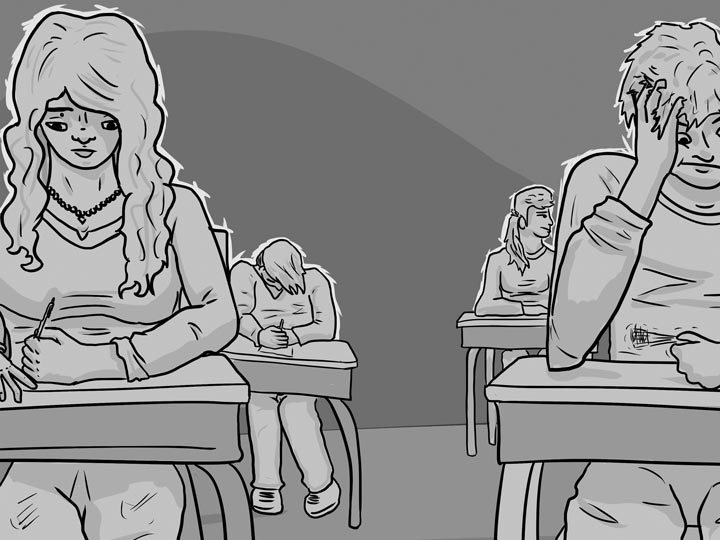
Final exam accommodations are fair
By Stephanie Tang, April 9 2015 —
Final exam accommodations seem unfair. You’ve spent the semester stressed out about a class, so why should some students get extra help when it comes time for finals?
But exam accommodations don’t give students special treatment. They level the playing field for those who need it.
When final exams are worth 35 to 50 per cent of a grade, it’s easy to get caught up in the stakes. Tank a final and you might fail the course. Fail the course and your GPA plummets. You’ll also lose $600 and have wasted hours of your semester on a course you then have to retake. No pressure.
But some students face bigger obstacles than stress, like dyslexia, anxiety or attention deficit hyperactivity disorder. Disabilities and mental illnesses can seriously impact a student’s ability to write a test in a noisy, crowded room on a prescribed time limit.
Accommodations give all students, regardless of their personal circumstances a chance to compete on equal grounds.
Accommodation requests are handled by the University of Calgary’s Student Accessibility Services. Students who can provide proof of their condition sign an accommodation agreement at the start of the semester. They bring it to their professors to be signed and once the form is returned to the SAS, a list of students and their accommodations are sent to faculty administrators.
Students then book exams through email, where they can request specific accommodations. Midterms have to be booked seven days beforehand. Finals are booked automatically. Students write their exams in the SAS Examination Centre, where staff do their best to accommodate everyone’s needs and requests.
It’s crucial to give students that extra support, whether it’s in the form of more time or allowing the use of extra materials. Those things can be controlled. Student health cannot.
Some students might say accommodations lend unfair advantages. They don’t. Quite the opposite, actually.
Removing accommodations would create an unfair advantage that would benefit no one. It would perpetuate an intolerant attitude towards students with disabilities and mental illnesses, and would paint the U of C as an inaccessible school.
Sure, the system can be abused. But that’s inevitable. There will always be people who park in handicap spaces when they’re not handicapped. Does that mean the city should eliminate them? No, because that doesn’t do anything for the old lady who can’t make it across an icy parking lot in winter to get to the grocery store.
If a policy is removed, it shouldn’t be to prevent a few from taking advantage. It should be because the policy isn’t benefitting those it was intended to help.
For improvements, the SAS should look at making their booking process more efficient. Staff currently have to answer every email booking request manually. Maybe that worked when they didn’t receive a lot of them. But one student says the deadline for booking an exam has gotten longer, going from 24 hours to 48 hours, then 72 hours and finally to seven days.
As demand grows, that’s inevitable. Staff need more time to process requests. But the more time that’s spent on administration, the less there is to spend on making improvements and helping students. That’s where the focus should be, and it suffers because of outdated technology that doesn’t do its job well.
The SAS should consider the system used by U of C’s Career Services. Emails, confirmations and reminders are sent to students automatically, and the booking is made automatically and viewable on a schedule. It would save countless hours that could be put to better use.
Allowing accommodations isn’t just important for making our campus an accessible place. It’s important for the students who need these accommodations. They deserve the same opportunities as everyone else.
